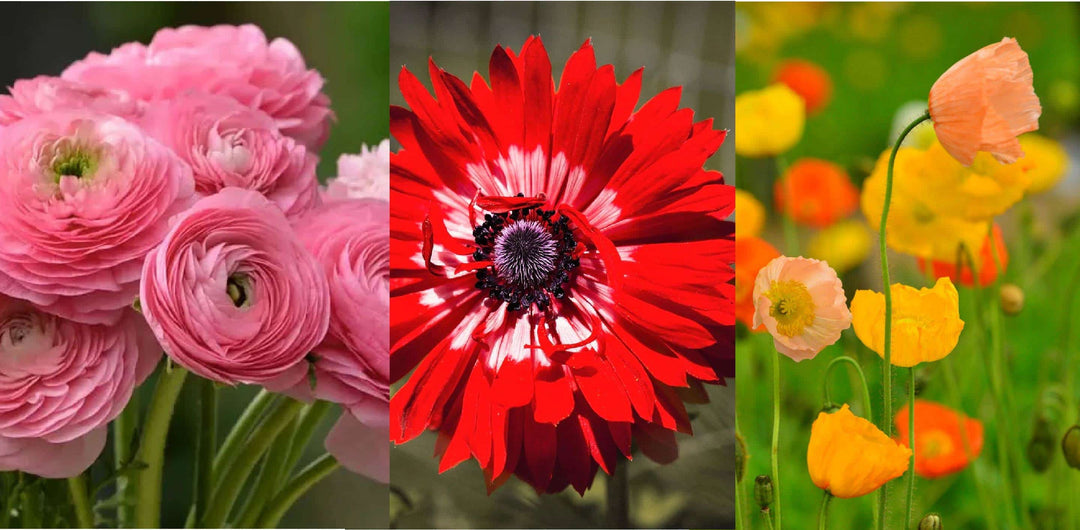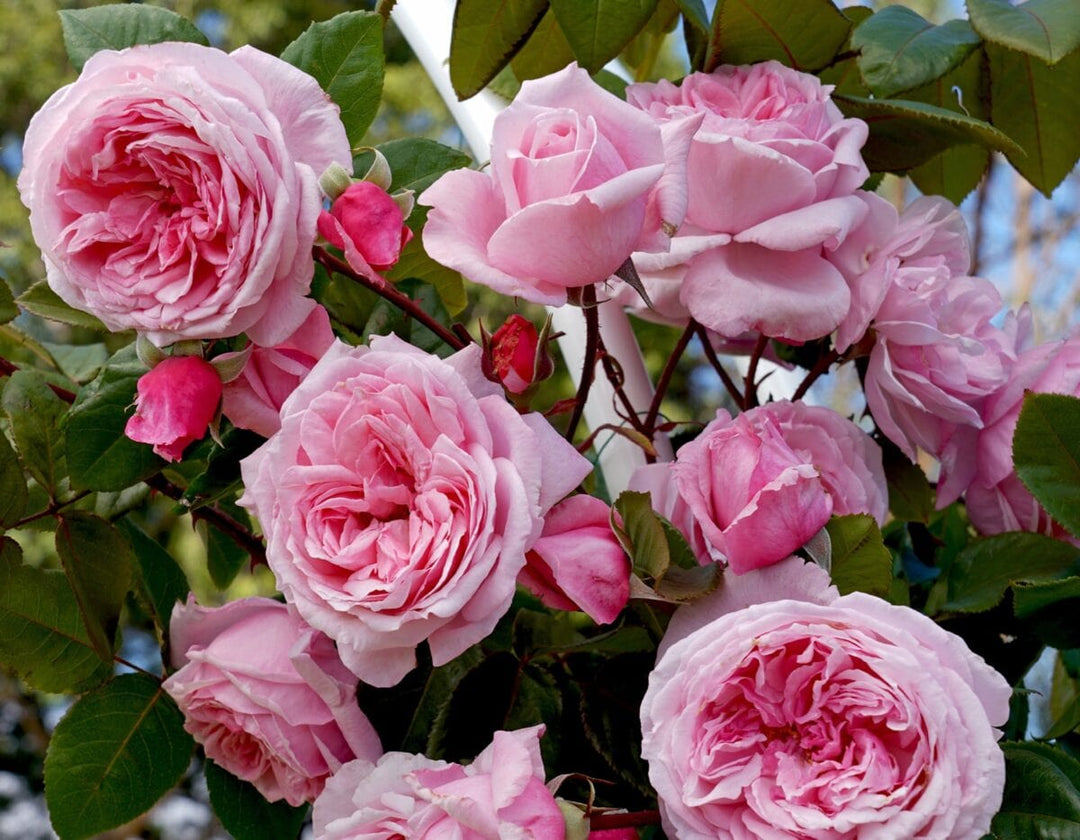How To Plant & Protect Fall Bulbs
How To Plant Fall Bulbs
Planting flower bulbs in the fall is a common topic of conversation, but understanding the reasons behind it, what types of bulbs to use, when to plant them, and how to do it can be quite intricate. Don't worry - we're here to support you. Below is a comprehensive guide that covers everything you need to know about planting flower bulbs during the autumn season.
Cool Temperatures
To ensure the optimal growth of spring-blooming bulbs, including garlic, it is crucial to expose them to longer periods of cold temperatures. This helps create the perfect conditions for their development and ensures a beautiful display in the springtime, this process is referred to as Vernalisation.
The vernalisation process is truly amazing as it jumpstarts a plant's growth by reducing its vegetative stage. This not only results in bigger and more abundant flowers, but also extends their lifespan. Furthermore, it strengthens the overall health of the plant, making it more resilient to both cold temperatures and fungal diseases.
In warmer regions, people need to refrigerate their spring-blooming bulbs to ensure proper growth. However, here in Canada, we are fortunate enough to simply plant them in the ground and let nature take care of the rest for us. It's a convenient and natural way to enjoy the beauty of these bulbs without any extra effort.
When To Plant Fall Bulbs in Canada
Planting fall bulbs can sometimes be overwhelming with all the different opinions and urban legends about the best time to do it. However, it doesn't have to be a complicated and mythical process. If you prefer, you can track soil temperatures and wait until they consistently stay below 15ºC before planting. But don't worry too much about being extremely precise – nature is resilient, and your bulbs will likely thrive regardless of the exact moment you choose to plant them.
A helpful tip for planting bulbs is to keep track of the weather. Once the temperatures start to drop and frost is a few weeks away, it's a good time to begin. Aim to plant your bulbs during the week when frost is predicted. This way, you can ensure they have a successful start in their new home. By planting your bulbs just before the first frost, you're giving them a chance to establish their root system before winter arrives. This helps them survive and flourish when spring comes around.
If October begins with unexpectedly warm weather, it would be ideal to wait for a week before planting. However, if waiting is not possible, there's no need to fret. You can go ahead and plant them whenever you're able to, whether it's earlier or later. Just make sure to keep an eye out for any signs of green sprouting after you've planted them.
TIP: If you notice tiny leaves starting to emerge, it's important to provide them with a protective layer of mulch. This will help keep them cozy and safe during the winter months.
Preparing Your Soil For Fall Bulbs
When it comes to preparing soil for bulb planting, there are a few helpful tips to keep in mind. First and foremost, choose an ideal location for your fall bulbs. Find an area that receives ample sunlight and has well-drained soil. Remove any weeds or debris from the planting site to give your bulbs a clean start. Next, loosen the soil using a garden fork or tiller, ensuring that it is not compacted which can hinder proper growth. Consider adding organic matter such as compost or peat moss to enrich the soil and provide necessary nutrients for your bulbs. By following these guidelines, you'll create a compassionate environment that promotes healthy bulb growth and beautiful blooms in the future.
How To Plant Fall Flowering Bulbs
To plant spring flowering bulbs in the fall, there's no need to feel overwhelmed. In fact, it's a straightforward process that can be easily followed by anyone with a green thumb or even those just starting out in gardening. To ensure successful blooming come springtime, there are three general guidelines that you should keep in mind. By following these simple steps, you'll be well on your way to creating a vibrant and colorful garden for everyone to enjoy.
-
When planting bulbs, it's important to remember the recommended guidelines for depth and spacing. Plant them three times deeper than their height, allowing them to establish strong roots. Additionally, space them two times wider apart than their height to give each bulb enough room to grow. For example, if your bulb is 2 inches tall, plant it 6 inches deep and ensure a spacing of 4 inches between each bulb. This will provide the ideal conditions for healthy growth and thriving plants in your garden.
-
When planting bulbs, it is important to remember that the pointy side should face upwards. This is because the leaves will emerge from this point, while the round bulb end is where the roots will develop. Taking care to plant them correctly will help ensure healthy growth for your plants.
-
To ensure the bulbs have a good start, it's important to give them a generous amount of water. Since they are planted at a deeper level, it's best to provide them with a long, gentle watering after planting. This will allow the water to penetrate deep into the soil, encouraging strong root growth.
Protecting Your Fall Bulbs
During the winter season, it's essential to take care of your fall bulbs and protect them from frost and freezing temperatures. By implementing some simple measures, you can ensure their survival and encourage their growth when spring arrives.
As winter approaches and the temperature drops, it's important to remember that our fall bulbs need some extra care and protection. These little wonders of nature hold the potential for beautiful blooms in the spring, but they are vulnerable to frost and freezing temperatures. By taking a few simple measures, we can ensure their survival and give them the best chance to thrive when spring arrives.
1.) One of the first steps is to provide a layer of insulation around your bulbs. This can be done by adding a thick layer of mulch or straw on top of the soil where your bulbs are planted. This protective layer will help regulate temperature fluctuations and shield them from harsh weather conditions.
2.) Another important aspect is proper watering. While it may be tempting to water less during the winter months, it's crucial to keep your bulbs adequately hydrated. Before the ground freezes, make sure they receive enough moisture so that they don't dry out. However, be cautious not to overwater as this can lead to rotting.
3.) In addition to insulation and watering, consider providing some shelter for your fall bulbs. If you have potted bulbs or those planted in exposed areas, you might want to move them closer to a wall or under an overhang that offers some protection from strong winds and extreme cold.
4.) Lastly, don't forget about pests! While many critters go into hibernation during winter, there are still rodents who might see your dormant bulbs as a tasty treat. To deter these unwanted visitors, place wire mesh or fencing around your bulb beds.
Remember that with proper care and attention, our fall bulbs will reward us with vibrant blossoms when spring finally arrives. By implementing these simple measures - insulating with mulch or straw, providing adequate water without overwatering, offering shelter from harsh elements and protecting against pests - we can ensure their survival and encourage their growth throughout the colder months.
Let's take this opportunity to show our love for these resilient plants by taking the necessary steps to protect them during winter. They are an integral part of our gardens, bringing joy and beauty to our lives when we need it most.
Sit Back and Wait
Planting fall bulbs in your spring garden can yield truly satisfying results. The vibrant blooms that emerge are a testament to the beauty and resilience of nature. It's a wonderful feeling to see your garden transform into a colorful paradise, with each bulb contributing its unique charm. The anticipation and patience required for this process make the eventual growth even more rewarding. So go ahead and enjoy the fruits of your labor, knowing that you've created something truly special in your own backyard. And check out our 2023 collection of Fall Bulbs to choose your favourite blooms.
















